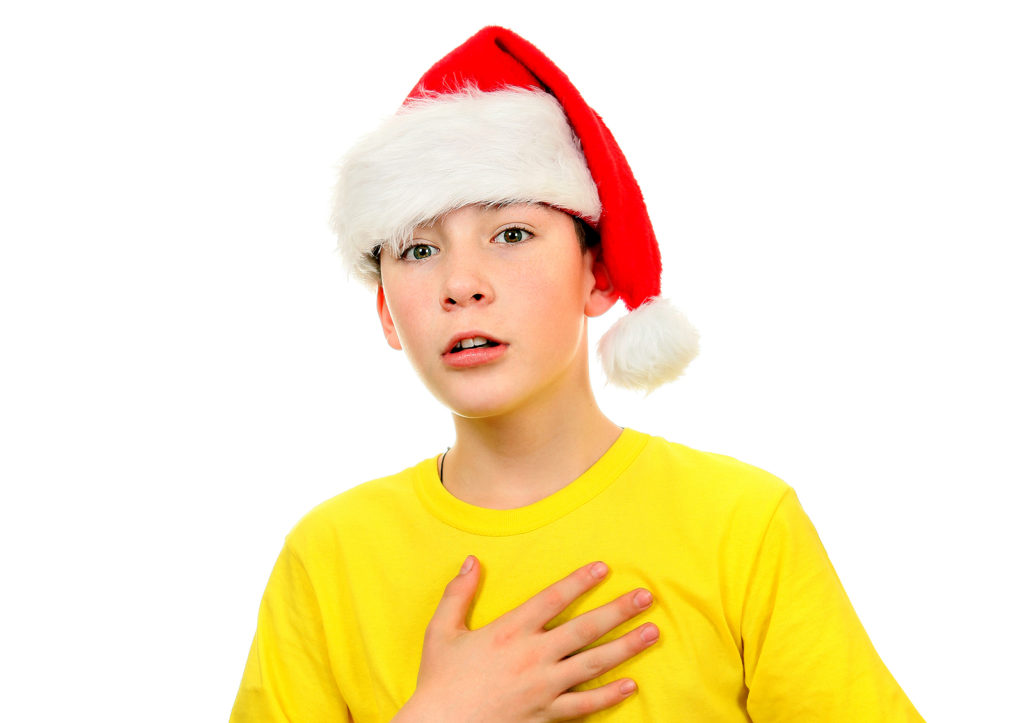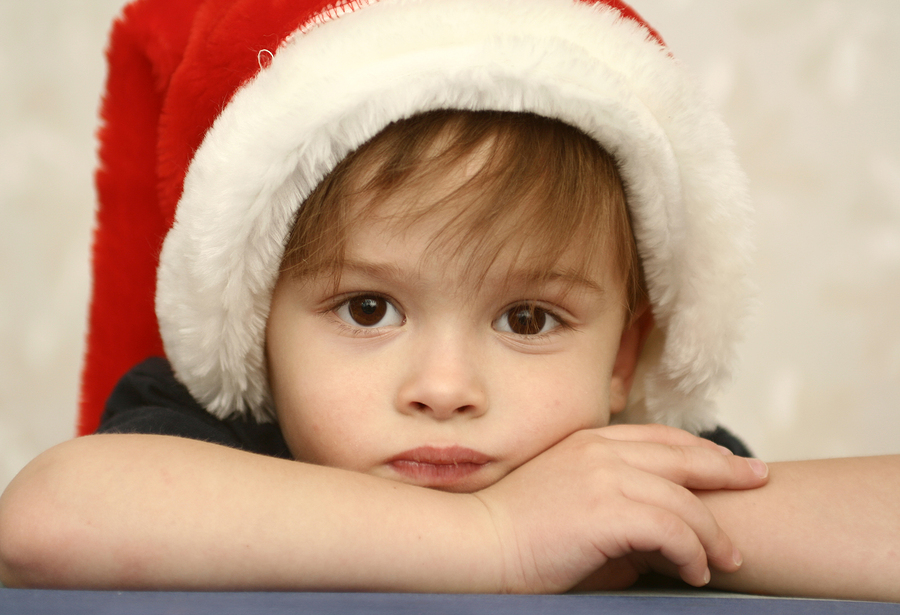5 Potential Triggers to Be Aware of During the Holiday Season
12/21/2017

It's here, it's here! My favorite time of the year! I love the hustle and bustle of shoppers and crowds. I love that everyone comes home to be together and that I get to play Christmas music twenty-four hours a day and sit in the glow of my twinkly tree. I love the baking and making plates of cookies for all my friends and family. I love celebrating with my kids in my classroom. Making gifts, teaching them about the holidays, kindness, and how it is better to give than receive. Until one day after school in 2013, I had a student come to my room when he had been sent out of class and told to go walk laps to try and regulate himself. He came into my Sensory Room and we began talking about his triggers. He said that he hated Christmas music (yes, I had it playing in my room) because it made him sad. He was never happy and couldn't wait for this time of the year to be over. When I pressed him as to why, he responded that it reminded him that his family had no money, they always fought during this time of the year and he hated getting excited and then not getting anything at Christmas. What was even worse was listening to everyone in his class talk about all the wonderful things they were going to do or get for Christmas and he did not want to let anyone know he was getting nothing. He always felt like he was doing something wrong.
That story hit me hard because I always felt that everyone loved Christmas and the holiday season and I never stop to think that there were some out there that had nothing positive to look forward to. I began to do some research and found I was shocked by some of the statistics I discovered. According to the latest statistics released by the USDA, there are 3.9 million households in America in which both adults and children are food insecure-which means they have limited or inconsistent access to food which is both nutritious and safe.[1] We go home for a full week during Christmas break and it is overwhelming to some who do not know where their next meal will come from. They have been eating twice a day by meals provided by schools. These kids have families who are working two and three jobs and still coming up short. The decisions in their family always involve, do I pay rent or bills or do I buy my child Christmas presents? The answer is not always an easy one. I can always tell who these students are because they have a selfless way they have been mastering for many years. Their answers are always, "I don't know", or "I'm okay, I don't need anything" when asked what they want for Christmas.
In addition, when teachers change from their everyday routines, they have to remember that students do not welcome surprises or embrace disorganization, especially those who come from a disorganized home life. Each day, 1.5 million children come to school from a homeless situation; 8,000 children are reported to public agencies as having been abused or neglected; and some quarter-million students refuse to come to school for fear of being bullied. What these students do not want is a school and a classroom that have no procedures and follow no instructional plan, where neither the teacher nor the students know from moment to moment what is going to happen next.[2]
These stressors affect our students every day in our classrooms and these sometimes create big behaviors that we may or may not understand. We think it will be so much fun to make gifts and write cards for our families or to create Ugly Sweater Art and share with our classes. If we are not in tune with our students, we may miss that these are also big triggers during the holiday season. To help these, and quite frankly, all of our students, maintain during the holiday season consider these five factors that can shut down their abilities to maintain in the classroom.
Inconsistent Structure
When teaching, do you ever feel that you are just too tired and try to find something "easier" to do with the students. This simply means you do not want to have to do an activity or lesson where you are "on" the entire time. What this means for kids already under stress during the holidays, is they are experiencing even more unknowns. For example, if they usually have math at 10 am and now you are scrapping math and watching a movie, they will now worry when you are doing math and what if you take away their favorite writing time or you will now do math when they are out of the room during their pull-out time and they will not know what to do. The body's system stays regulated when things or events happen in a predictable, known pattern. During the holiday season, fight the urge to change a lot of things around during your school day. Pick some special activities ahead of time and put them up on a visible daily schedule. It will keep you and your students on track. When you randomly change events in your day, these changes lead you to be less prepared. You may scramble around the room finding materials or rounding up supplies needed for the new change. These impulsive moves lead to less productivity for students which can cause an uptick of student behaviors due to more down time. This leads to anxiety for students who become unregulated frequently due to the inability to filter out too much stimulation. The fear of the class getting in trouble is sometimes too much for certain kids and it increases their behaviors. Predictability and repeated routines are calming for all students.
Chaos and Overstimulation

Students do not like chaos, even though sometimes it feels like they bring on the chaos. Overstimulation can create an increase of behaviors. Some students cannot filter out the extra stimuli that is bombarding them and they end up with squirrely nervousness, headaches, a quick temper, an unfocused approach to a task, or an inability to get started and stay on task. The holidays are full of potential situations as there are schedule changes with holiday programs and practice, gift and card making, Christmas parties, the anticipation of Santa and being home for the entire break. A lot of these events you do not have much control over, so find your power in other places. Use low lighting to keep the body less stimulated. Talk softly and slowly to keep the pace and cadence a calming one. Choose only one extra activity a day, if possible, to help prevent even more changes or overstimulation. Be very aware at giving one step directions and plan in extra time to complete activities. A quick and sometimes very negative trigger proves to be when students are not given ample time to complete a task. If they are engaged and working hard, consider letting the activity continue if times runs out so that kids can feel closure with the assignment.
Calendar Time
This can be a very stressful trigger for a student who is not excited about the school. While you are counting down to Christmas and the students are celebrating almost being done, the other students who are rolling around on your carpet are upset because while you are cheering, "Only three days left until break, yay!" They are silently screaming, "Oh no, only three days left until break." The anxiety or fear that goes with all the unknowns of finding food, or getting gifts, or being at home in an abusive situation, etc. is almost too much for some of these students to take. As a result, you may see "oozing". They may make noises, roll on the floor, hide or run. They may tear papers up or scribble all over a worksheet or notebook page. They may get into fights at recess or become aggressive in their behaviors. It depends on the severity of their anxieties and the amount of chaos you are presenting in your classroom. I find myself talking slower and quieter during this time. I will also give choices consistently to help my students gain a feeling of power that may have be missing. I also add in more quiet work time, Daily 5 rotations (because they are my students' favorite part of their day), and any other calming activity that engages their thinking. I also offer more partner work because when they are struggling getting work done alone, a partner can help give them support to continue with the activity.
Unsupportive Classrooms
I spend the whole month of December using my read alouds that focus on character development. I also teach Zones of Regulation for a few minutes each morning and really work on my Olweus, anti-bullying class meetings during this month. I also have started projects earlier in the year that support my students in catching other students doing something awesome. I always tell my students that we will get what we pay attention to and therefore, I want to pay attention to all the positive things that are happening in our classroom and our school. Do you find that during the holidays behaviors amp up? Do you find that students go through and cause a lot more drama? It seems sometimes they just keep grumbling and complaining or tattling. Their stamina struggles just like ours. Since I have been consistent in focusing on a supportive classroom where we highlight positive behaviors and reward when I or someone else sees them exhibiting the behavior, I find that my classroom stays calmer. I started an Affirmation Wall[3] at the beginning of the year that I read about on a great site called www.cultofpedagogy.com. I have my students write letters to each other every day and then they "mail" them in our class mailbox. I then go through the letters for content and appropriateness and mail them out for students the next morning. I have since refined the focus by having the students choose one person each day that they have never or seldom ever written to or talked to before. They watch them in the classroom, at recess, in specials, or in lunch to catch them doing something amazing. It could be the student helped someone else or gave a compliment or invited a left-out student to play. They then write a letter to that student and tell them what they caught them doing during the day. I have seen students rush to help someone pick up dropped books or papers, invite others to play, sit with different kids in the lunchroom, stay in at recess to mentor someone struggling to finish a math assignment. These behaviors help create a positive classroom environment and then when big behaviors do emerge, I have a classroom with a lot more empathy and understanding. I have a student who used to scare others last year with the behaviors and now I have kids writing him letters telling him they notice how hard he is working to maintain regulation in class. This has helped students have a different perspective of their classmates and their own classroom. In times of high anxiety, the more supportive of a classroom one can be in, the more regulated a student will remain.

Too Many Special Events
While these are the fun for many kids and parents and teachers, they can be a huge trigger for students who live in poverty. This can be for many reasons. They have parents and guardians who cannot come to anything because they are busy working one or two or three jobs. They may not have a car or enough gas to get to the school. They may not get their paycheck until after your gift exchange or class party and therefore are unable to send in treats, or a gift, or buy a new outfit for the holiday program. Now we are asking students to get on the risers in front of many, many parents--none of whom are there to watch them. They will be one of five kids still at school after the program because no one could take them home. These become reinforcers for students and can trigger anxiety and cause students to become unregulated. While I believe we should still have these special events, I believe we should use grace and empathy to drive our planning of these events. Try to plan a super-fun-you-don't-want-to-miss-it art project or activity after the program so those students feel special still being there. Have a plan for supplementing a gift exchange so all may participate. I ask at the beginning of the year if any of my parents would like to be sponsors for students who may not have the means to bring in treats. When those occasions arise, I always check in with the parents to make sure they are not able to contribute and if that is the case I contact the sponsor and then that student gets to feel special passing out treats on that day. Make sure to give all parents plenty of head's up because if they can contribute, they would like to--most just need more plan-ahead time.
Holidays can be stressful, expensive, and cause some kids to experience more fear and worry than enjoyment. Keep in mind these five potential triggers when planning to avoid an increase of behaviors. In addition, if you communicate from the first day of school about how the expectations in your room will go with these types of situations and you work to build that empathy during the year, then when the holidays roll around, the students will be able to stay more regulated and enjoy their holiday experience. As students support each other and show more empathy, students will feel like it can become the most wonderful time of the year.
[1] "EthicalFoods.com | Child Poverty & Hunger During the Holidays." https://ethicalfoods.com/child-poverty-hunger-holidays/. Accessed 11 Dec. 2017.
[2] "Classroom Management 2: Consistency Is Key | Scholastic." https://www.scholastic.com/teachers/articles/teaching-content/classroom-management-consistency-key/. Accessed 12 Dec. 2017.
[3] "Classroom Eye Candy 1: A Flexible-Seating Paradise | Cult of Pedagogy." 19 Nov. 2015, https://www.cultofpedagogy.com/flexible-classroom/. Accessed 11 Dec. 2017.
- A 5th Grade Teacher’s Guide to Surviving October - October 10, 2018
- Dear Students… Here are the 5 Big Ideas I Hope You Learned This Year - May 21, 2018
- 11 Strategies to Encourage Students to Own Their Learning - January 19, 2018











